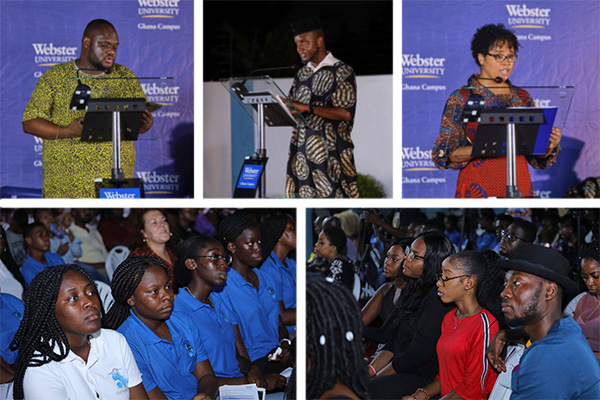Webster Ghana Examines the ‘Surviving R. Kelly’ Documentary Series
April 05, 2019

In a digital era in which the past no longer stays in the past, some of the entertainment industry's most powerful men have been surprised to find themselves being held to account.
Since its airing last month, the controversial Lifetime documentary series, Surviving R. Kelly, has seen the #MeToo movement catch up with a global superstar, bringing into the light long-rumored details of hidden abuse and trauma.
In light of this development, Webster University Ghana Campus held a public lecture entitled "Celebrity, Complicity and Community: Making Sense of ‘Surviving R Kelly.’" A panel of three Webster University lecturers at the Ghana campus - Kobina Ankomah-Graham, Erinn Ransom Ofori and Eli Tetteh - explored the theme at the 14th public lecture held at Webster University’s Ghana Campus.
Collectively, the panel of three pop culture scholars and two invited prominent Ghanaian feminists, Kinna Likimani, Director of Special Programs at Odekro, and Nana Akosua Hanson, pointed out society’s collective complicity in failing to hold celebrities to account.
Presenting her lecture on "The Value of Black Life," Erinn Ransom Ofori, noted that this is a time for critical reflection, introspection, and honesty with ourselves and our values as a society. “Unless we are in a habit of thinking critically and conscientiously about these kind of issues, then we as a community will continue to be complacent,” she argued.
Eli Tetteh, speaking on "21st Century Black Masculinity," encouraged men to have empathy for survivors and also make the decision to stand publicly with the less powerful and less privileged. He urged that “responsibility lies in the hands of all men and it is up to us as men to hold ourselves accountable.”
Kobina Ankomah-Graham, who also served as the moderator for the event, presented his lecture on "Why Should it Matter to Africa?" He also shared compelling statistics on the complicity of African societies on the issues of abuse against women in general. “Attitudes, beliefs, and cultural practices which place men above women have led to a ‘casual’ overlooking of violence against women,” he said.
Joining in on the panel discussion, Kinna Likimani noted that the Ghanaian society rides on a number of misconceptions that give room to the rise of abuse. “The burden of proof in the court rarely favors the victim because the law is always about power,” she added.
Nana Akosua also blamed the justice system for not being proactive in dealing with perpetrators of abuse. “The reason for the #MuteRKelly is because there isn’t enough justice done to perpetrators,” she noted.
As a way of lending support to victims and survivors, a resource list containing information on counseling centers, psychologists, and government agencies focused on women’s rights across the country was provided for all participants.
The event attracted significant representation from feminist groups, selected high school and university students, counselors, educators, media representatives, diplomats, and the public at large. Contributions from the discussion were tweeted as well as live streamed on Facebook throughout the evening.
